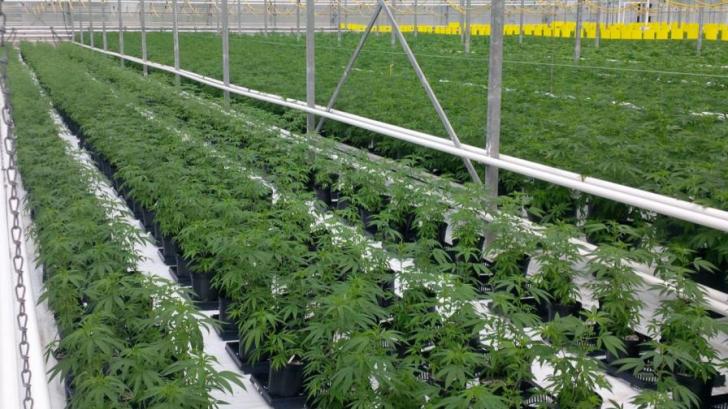News / National
Production challengers hinder cannabis farming
12 Dec 2024 at 07:00hrs | Views

The Agricultural Marketing Authority (AMA) has noted a growing interest in cannabis farming in Zimbabwe for medicinal purposes, but production challenges are slowing the growth of the sector.
AMA CEO Clever Isaya shared the update during a tour of Thatokuhle Farm in Bulawayo, where officials from the Ministry of Agriculture gathered for an Industrial Hemp and Medicinal Cannabis Field Day.
"Since the legalization of industrial hemp in Zimbabwe in 2020, we have witnessed significant growth in the sector," Isaya said. "In 2020, there were 21 registered players in the industry. This number has more than doubled to the current 47, comprising 23 cultivators, 14 merchants, and 10 breeders."
Despite this growth, Isaya pointed out that there are several challenges that continue to hinder the sector's full potential. One major issue is the knowledge gap surrounding cannabis farming, particularly concerning production and productivity.
"There are several obstacles that hinder cannabis farming, including accessibility to local seeds," Isaya explained. "Limited access to seeds has significantly slowed down production for many registered growers."
Additionally, the high capital requirements for cultivating cannabis present a barrier for many farmers. "The cost of cultivating CBD flowers ranges between US$10,000 and US$50,000 per hectare, making it difficult for small-scale farmers to enter the market," he added.
Another challenge highlighted by Isaya was the market dynamics, particularly issues with off-takers who have failed to honor their obligations. This has resulted in unsold CBD oil stock, creating setbacks for some farmers.
However, Isaya expressed optimism for the future, expecting improvements during the 2024-2025 season. "To date, three firms—African Medical Biotech, Swiss Bio, and Ivory Medical - have been registered and are processing hemp into CBD oil," he said. "These efforts include the development of the CannaQure brand, which offers six lines of complementary medicines. Additionally, innovative products such as hemp cigarettes are under consideration."
The legalisation of cannabis for medicinal and research purposes in Zimbabwe dates back to 2018, making it the second country in Africa, after Lesotho, to legalize the cultivation of cannabis. Prior to this, cannabis cultivation, possession, and use were illegal, with offenders facing up to 12 years in jail.
While the sector shows promise, these production and market challenges continue to require attention as Zimbabwe aims to establish itself as a leader in the global cannabis industry.
AMA CEO Clever Isaya shared the update during a tour of Thatokuhle Farm in Bulawayo, where officials from the Ministry of Agriculture gathered for an Industrial Hemp and Medicinal Cannabis Field Day.
"Since the legalization of industrial hemp in Zimbabwe in 2020, we have witnessed significant growth in the sector," Isaya said. "In 2020, there were 21 registered players in the industry. This number has more than doubled to the current 47, comprising 23 cultivators, 14 merchants, and 10 breeders."
Despite this growth, Isaya pointed out that there are several challenges that continue to hinder the sector's full potential. One major issue is the knowledge gap surrounding cannabis farming, particularly concerning production and productivity.
"There are several obstacles that hinder cannabis farming, including accessibility to local seeds," Isaya explained. "Limited access to seeds has significantly slowed down production for many registered growers."
Additionally, the high capital requirements for cultivating cannabis present a barrier for many farmers. "The cost of cultivating CBD flowers ranges between US$10,000 and US$50,000 per hectare, making it difficult for small-scale farmers to enter the market," he added.
Another challenge highlighted by Isaya was the market dynamics, particularly issues with off-takers who have failed to honor their obligations. This has resulted in unsold CBD oil stock, creating setbacks for some farmers.
However, Isaya expressed optimism for the future, expecting improvements during the 2024-2025 season. "To date, three firms—African Medical Biotech, Swiss Bio, and Ivory Medical - have been registered and are processing hemp into CBD oil," he said. "These efforts include the development of the CannaQure brand, which offers six lines of complementary medicines. Additionally, innovative products such as hemp cigarettes are under consideration."
The legalisation of cannabis for medicinal and research purposes in Zimbabwe dates back to 2018, making it the second country in Africa, after Lesotho, to legalize the cultivation of cannabis. Prior to this, cannabis cultivation, possession, and use were illegal, with offenders facing up to 12 years in jail.
While the sector shows promise, these production and market challenges continue to require attention as Zimbabwe aims to establish itself as a leader in the global cannabis industry.
Source - newsday

















